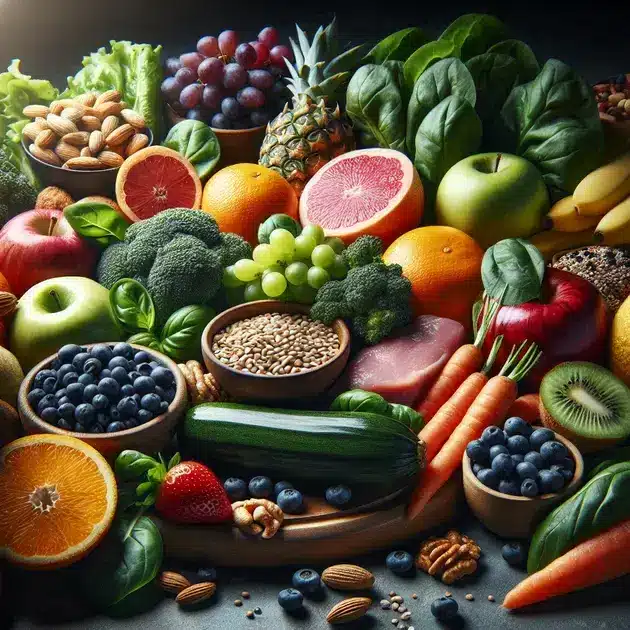Are you struggling to achieve weight gain effectively? Look no further, as this comprehensive guide will provide you with all the information you need to reach your goals. In a world where many focus on weight loss, it’s important to understand the unique challenges and strategies associated with gaining weight in a healthy manner.
From nutrition tips to workout routines tailored for muscle growth, this guide covers it all. With the right approach and knowledge, you can achieve weight gain effectively and transform your body in a sustainable way. Let’s dive into the details and start your journey towards a healthier, stronger you.
Tips for Healthy Weight Gain
Struggling to gain weight is a common challenge for many individuals who are looking to improve their health and fitness. It requires a strategic approach that involves a combination of nutritional choices, exercise routines, and lifestyle changes. Here are some effective tips to help you achieve healthy weight gain:
1. Track Your Calories and Macros
One of the key components of healthy weight gain is ensuring that you are consuming enough calories and macronutrients to support muscle growth and overall weight gain. Using a calorie tracking app like MyFitnessPal can help you monitor your food intake and make sure you are eating enough to support your goals.
2. Focus on Nutrient-Dense Foods
When trying to gain weight, it’s important to focus on nutrient-dense foods that provide your body with essential vitamins, minerals, and antioxidants. Incorporate foods like nuts, avocados, lean proteins, whole grains, and healthy fats into your diet to fuel your body and support weight gain.
3. Create a Strength Training Routine
In addition to proper nutrition, building muscle mass is crucial for healthy weight gain. Incorporate a strength training routine into your exercise regimen to help stimulate muscle growth. Apps like StrongLifts 5×5 or Fitbod can provide you with structured workouts to follow.
4. Stay Consistent and Patient
Remember that healthy weight gain takes time and consistency. It’s important to stay patient and stick to your goals, even when progress may seem slow. Celebrate small victories along the way and trust the process.
5. Get Plenty of Rest and Recovery
Rest and recovery are essential components of any weight gain journey. Make sure to prioritize getting enough sleep each night, as this is when your body repairs and builds muscle. Consider using apps like Sleep Cycle or Calm to help improve your sleep quality.
Understanding the Challenges of Weight Gain
Weight gain can be a challenging and frustrating process for many individuals, especially those who have struggled with maintaining a healthy weight in the past. Understanding the common challenges associated with weight gain is the first step towards overcoming them. Here are some key challenges to be aware of:
1. Metabolism and Genetics
Factors such as metabolism and genetics can play a significant role in determining an individual’s ability to gain weight. Some people may have a naturally fast metabolism, making it harder for them to put on weight. Understanding your unique metabolism and genetic predispositions can help you tailor your approach to healthy weight gain.
2. Emotional and Psychological Factors
Emotional and psychological factors, such as stress, anxiety, and body image issues, can also impact weight gain. Emotional eating or disordered eating patterns can hinder your progress towards a healthy weight. Consider seeking support from a therapist or counselor to address these underlying issues.
3. Social and Environmental Influences
Your social and environmental surroundings can influence your eating habits and lifestyle choices. If you are surrounded by individuals who prioritize unhealthy eating habits or have limited access to nutritious foods, it can make it challenging to gain weight in a healthy way. Look for local community resources or online platforms like Noom to connect with a supportive community.
4. Inconsistent Habits and Lack of Planning
Consistency is key when it comes to healthy weight gain. Inconsistent eating habits or lack of meal planning can derail your progress. Set aside time each week to meal prep and plan your meals to ensure that you are consistently consuming enough calories to support weight gain. Apps like Mealime or PlateJoy can assist you in meal planning.
5. Medical Conditions and Hormonal Imbalances
Underlying medical conditions or hormonal imbalances can also impact your ability to gain weight. If you suspect that a medical issue may be contributing to your struggles with weight gain, consult with a healthcare professional for proper diagnosis and treatment. Utilize telemedicine platforms like LiveHealth Online for virtual consultations.
Understanding the Importance of Nutrient-Dense Foods
Nutrient-dense foods play a crucial role in maintaining overall health and well-being. These foods are packed with essential vitamins, minerals, and antioxidants that are vital for proper functioning of the body. Consuming nutrient-dense foods can help boost the immune system, improve energy levels, and support weight management. In a world where processed and fast foods are readily available, making a conscious effort to include nutrient-dense foods in your diet is key to promoting longevity and reducing the risk of chronic diseases.
To incorporate more nutrient-dense foods into your diet, focus on adding a variety of fruits, vegetables, whole grains, lean proteins, and healthy fats. Choose whole foods over processed options and opt for organic produce when possible to maximize the nutritional content of your meals. Experiment with different cooking methods to retain the nutrients in your foods, such as steaming vegetables or grilling lean meats.
When planning your meals, aim to create balanced plates that include a mix of macronutrients and micronutrients. Include a source of protein, carbohydrates, and fats in each meal, along with a colorful array of fruits and vegetables. Be mindful of portion sizes and listen to your body’s hunger and fullness cues to maintain a healthy relationship with food.
Overall, prioritizing nutrient-dense foods in your diet can have a significant impact on your overall health and well-being. By fueling your body with the right nutrients, you can feel more energized, improve your mood, and support your long-term health goals. Remember, food is fuel, so choose wisely to nourish your body from the inside out.
Incorporating Strength Training for Muscle Gain
Strength training is a crucial component of any muscle-building regimen. By challenging your muscles with resistance exercises, you can stimulate muscle growth, increase strength, and improve overall body composition. Incorporating strength training into your fitness routine can help you achieve your goals of muscle gain and improve your overall physical performance.
To incorporate strength training for muscle gain, start by establishing a solid workout routine that targets different muscle groups on alternate days. Focus on compound exercises such as squats, deadlifts, and bench presses to engage multiple muscle groups simultaneously and maximize your gains. Gradually increase the weight and intensity of your workouts to continuously challenge your muscles and promote growth.
It is also important to prioritize proper nutrition to support muscle growth and recovery. Ensure you are consuming an adequate amount of protein to repair and build muscle tissue, along with complex carbohydrates for sustained energy during your workouts. Stay hydrated and consider incorporating supplements such as protein shakes or creatine to enhance your muscle-building efforts.
Consistency is key when it comes to strength training for muscle gain. Make sure to adhere to your workout schedule, track your progress, and make adjustments as needed to continue making strides towards your goals. Listen to your body, rest when necessary, and always prioritize proper form to prevent injury and maximize results.
Creating a Consistent Meal Plan for Weight Gain
For individuals looking to gain weight in a healthy and sustainable manner, creating a consistent meal plan is essential. A well-balanced meal plan that includes a surplus of calories and nutrient-dense foods can help support muscle growth, increase energy levels, and promote overall weight gain. By strategically planning your meals and snacks, you can ensure that you are meeting your body’s increased caloric needs and fueling your workouts effectively.
When creating a meal plan for weight gain, focus on including a variety of nutrient-dense foods that are rich in protein, healthy fats, carbohydrates, and vitamins and minerals. Incorporate foods such as lean meats, poultry, fish, nuts, seeds, whole grains, fruits, and vegetables into your meals to ensure you are getting a well-rounded nutritional profile.
Divide your meals into smaller, more frequent servings throughout the day to prevent feeling overly full and to maintain a steady intake of nutrients. Include pre- and post-workout snacks to fuel your exercise sessions and support muscle recovery. Be mindful of portion sizes and adjust your meal plan as needed based on your weight gain progress and physical activity levels.
Consistency and adherence to your meal plan are key to achieving weight gain goals. Aim to eat at regular intervals, stay hydrated, and listen to your body’s hunger cues. Keep track of your calorie intake and monitor changes in your weight and body composition to assess the effectiveness of your meal plan. Remember that sustainable weight gain takes time and patience, so trust the process and stay committed to your nutritional goals.
Conclusion
In conclusion, understanding the importance of nutrient-dense foods is vital for maintaining overall health and well-being. By incorporating these foods into your diet, you can benefit from essential vitamins, minerals, and antioxidants that support proper body function. Prioritizing nutrient-dense foods can boost your immune system, increase energy levels, and aid in weight management, reducing the risk of chronic diseases.
Additionally, incorporating strength training into your fitness routine is key to achieving muscle gain and improving physical performance. By challenging your muscles with resistance exercises and focusing on compound movements, you can stimulate muscle growth and enhance strength. Proper nutrition, including adequate protein and carbohydrates, is crucial for muscle recovery and growth, along with staying hydrated and considering supplements to support your efforts.
Creating a consistent meal plan for weight gain is essential for those aiming to increase weight in a healthy and sustainable way. By including nutrient-dense foods rich in protein, healthy fats, and carbohydrates, you can support muscle growth and energy levels. Dividing meals into smaller, frequent servings, incorporating pre- and post-workout snacks, and monitoring your calorie intake are key aspects of a successful meal plan for weight gain. Consistency, proper hydration, and listening to your body’s cues are essential for achieving your weight gain goals effectively.


















